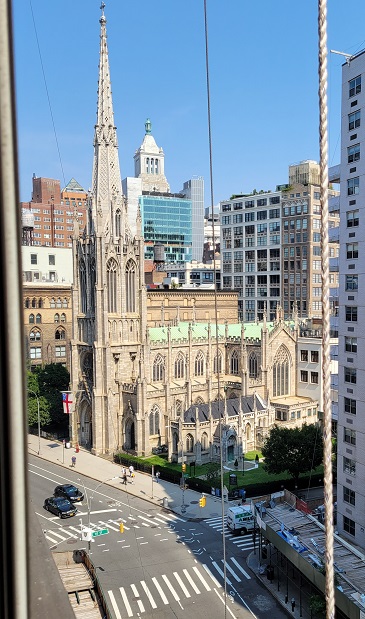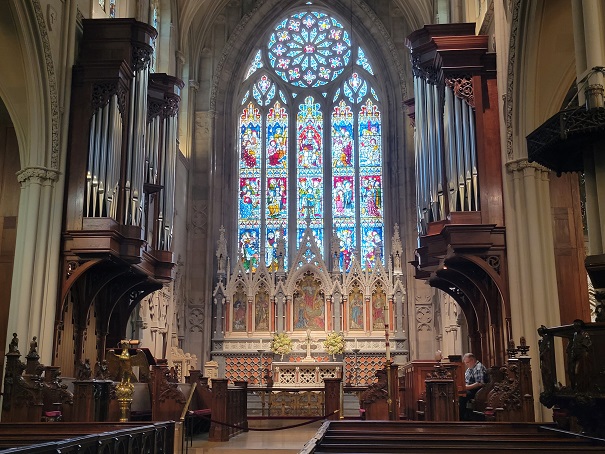Concert Diary: Bach at Noon
September 17, 2021
New York, N.Y.
Among the many New York City sounds I hear in my apartment are church bells tolling the hour and sometimes playing hymns on Sunday. Leaning from my 10th-floor window, I can see the source. It’s Grace Church, residing between 10th and 12th Streets west of Broadway:

(Pardon the ropes; work is being done on my building.)
Grace Church is now 175 years old. In the early 1840s, the church was being moved from an earlier site in lower Manhattan, and they held a competition to design a new structure. The 25-year-old James Renwick had been educated as a structural engineer rather than an architect, but he had studied European gothic churches, and his design won the commission. The church was completed in 1846 and Renwick went on to an illustrious career, including the design of the Smithsonian Institution Building, St. Patrick’s Cathedral, and many other notable structures.
If you read Caleb Carr’s The Alienist, you might remember that the team of sleuths set up their headquarters on Broadway in the building just north of Grace Church. (You can almost see them through the window there.)
Grace Church is also sometimes cited as the inspiration for Edgar Allan Poe’s 1848 poem “The Bells” although other churches claim the credit.
The bells aren’t the only music coming from Grace Church. The church hosts enough music to define a music subdomain of their website: music.gracechurchnyc.org.
This week, the new season of the church’s Bach at Noon series started, scheduled for Tuesday, Wednesday, and Friday until May 21, 2022. The concerts consist of about a half hour of Johann Sebastian Bach’s organ music starting at 12:20 played by organist Patrick Allen on the church’s pipe organ:
There’s Dr. Allen in the lower-right corner. Admission is free, of course (although contributions are welcome), and there’s plenty of pew seating. You must be vaccinated and masked to enter the church.
The catalog of Bach’s music known as the Bach-Werke-Verzeichnis lists just under 250 organ compositions — a mix of secular works (such as organ sonatas, preludes and fugues, and organ concertos) and chorale preludes that are based on Lutheran hymns with titles such as O Mensch, bewein dein Sünde groß ("O man, bewail thy sin so great").
Based on the three concerts I attended this week, Dr. Allen manages to fit in three, four, or five pieces per 30-minute program, a mix of the secular and religious. On Tuesday, he played the Fantasie and Fugue in C-minor (BWV 537) and the famous Passacaglia and Fugue in C-minor (BWV 582). On Wednesday and today he played two of the six Organ Sonatas (BWV 525 and 528). Wednesday’s concert also included the wonderful Fantasy in G (BWV 572), and today’s program began with the Fugue on a Theme by Corelli (BWV 579).
Programs are posted at the entrance to the church, and can also be found on the program-agenda page of Dr. Allen’s website. Click the calendar day. The concerts are also streamed live on the church’s Facebook page via a phone propped up on a music stand, and remain available for later viewing.
For people who live in the neighborhood, the Bach at Noon concerts provide a pleasant break in the day, and I’m hoping to finally get Bach’s organ music straight in my head. Bach was my first love over 50 years ago, and although I’m familiar with a lot of his major compositions — concertos, harpsichord music, passions, the Mass, cantatas — the organ music never quite made it to the forefront, so I think hearing several pieces a week is going to help remedy that.
